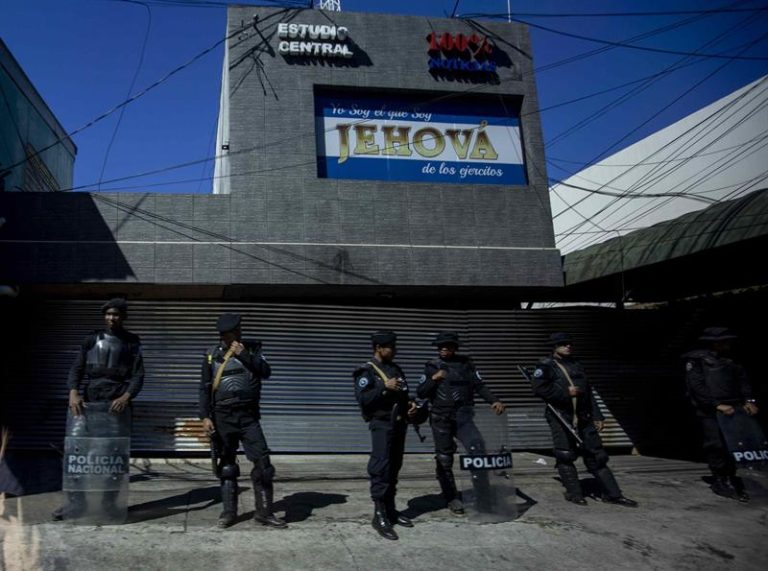26 de junio 2019

The Return of the Military

PUBLICIDAD 1M
PUBLICIDAD 4D
PUBLICIDAD 5D
The regime even refused to return the ID documents they had taken from the released political prisoners.

EFE / Confidencial
The government of Daniel Ortega and Rosario Murillo refuses to return the belongings that were taken by their National Police and paramilitaries from the released political prisoners, non-governmental organizations, different communications media and self-organized people who have supported the protests against the regime. This even violates the government’s own self-Amnesty Law, approved by Ortega´s deputies in the National Assembly.
The total amount of the confiscated assets and personal belongings has not been quantified and there is no established mechanism for their return. In the particular case of the political prisoners, the authorities of the Penitentiary System where supposed to return to them their belongings at the moment they were released, however, the officers kept everything, even their identification documents.
Miguel Mora stripped of everything
Journalist and released political prisoner, Miguel Mora, had his television channel and six vehicles confiscated, they froze his bank accounts and when they took him to the infamous El Chipote interrogation jail, they stripped him of his cell phone, his wallet with all his identification documents, his watch and even his wedding ring. His wife, journalist Veronica Chavez, says that they have exhausted all legal avenues to have their property returned, but the regime shows no sign of complying with the law.
“We are still confiscated and our call to this government is to have some decency and return our property because otherwise it is called theft. It would be a blatant robbery. There is no reason; before they justified themselves by saying that Miguel was been (judicially) prosecuted, but Miguel now is free and our assets must be returned because they never should have been confiscated,” Chavez claimed.
The journalist estimated that the assets that were occupied are around five million dollars, distributed between the TV station’s building, television channel equipment, office furniture and vehicles. She also noted that there was never a reason to confiscate. “Everything was ‘at the point of their guns’ and currently they have not called us, they’ve given no signals. We know that it was on the negotiation table with the (Civic) Alliance. They (the Government) committed themselves to the OAS to return the property, but have not complied,” she regretted.
Juan Sebastian Chamorro, of the Civic Alliance for Justice and Democracy, expressed that they are preparing a protocol for the return of the confiscated property, a document which they intend to deliver to the regime if and when the negotiations between the parties resumes.
“It is a protocol which is still being worked on with the people affected, but is a document in process, so it is not yet a public document. However, it a basic element for the negotiations. I can tell you that 100% Noticias and Confidencial-Esta Semana are the ones that appear most affected because they are the ones that had buildings, [including newsrooms and studios] confiscated…there is also Radio Dario, among the most affected,” said Chamorro.
Yonarqui Martinez, a lawyer for several political prisoners confirmed that with the enactment of the Amnesty Law, on June 10, the regime had to close all court cases against the political prisoners, release them and proceed to return all their assets; however, none of this has happened.
On June 10 when Chester Membreno was released, along with fifty political prisoners, he arrived at his home in Masaya with tight fitting shorts and an old shirt. When approached by Confidencial, Membreno apologized for his clothing and reported that before leaving prison an officer ordered him to take a couple of pieces from a bale, as second-hand clothes are known in Nicaragua, and to change from his prisoner’s uniform.
Like Membreno, most of the released political prisoners came out dressed in second-hand clothes and others in prison uniform, since nothing was returned to them when they left prison.
On June 11, Irlanda Jerez, the leader of merchants at the “Mercado Oriental,” regained her freedom but on the same day Ortega’s paramilitaries took over her home and on June 14, the national police and firefighters ransacked a warehouse of the merchant, with the argument of a supposed fire.
Thank you for reading our English section, brought to you in collaboration with Havana Times. If you wish to subscribe to our English Weekly Newsletter, you can do it here. Please spread the word and share this link with your friends, family or contacts.
Regards,
Archivado como:
PUBLICIDAD 3M
Confidencial es un diario digital nicaragüense, de formato multimedia, fundado por Carlos F. Chamorro en junio de 1996.
PUBLICIDAD 3D